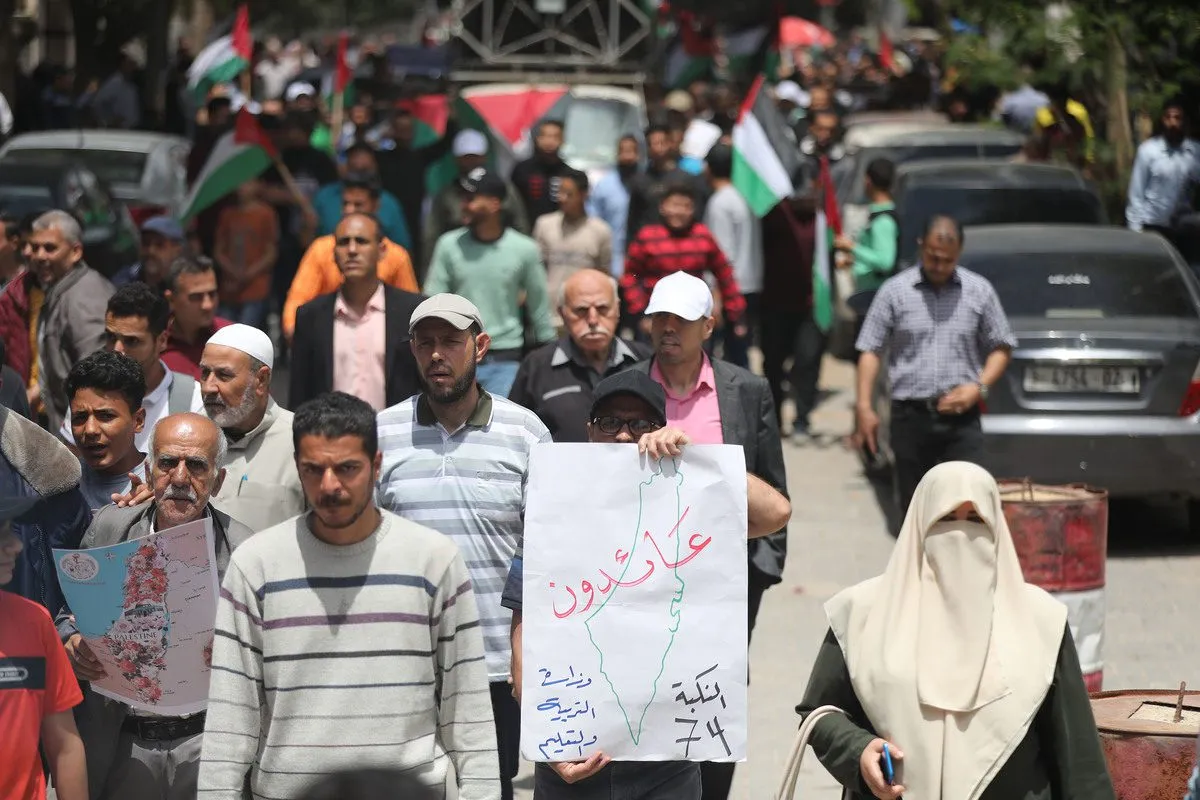On May 15, the Palestinian Nakba will be 75. The ethnic cleansing that began in historic Palestine between late 1947 and mid-1948 resulted in the forced removal of nearly 800,000 of the descendants of Palestinians from their homes and lands, as well as the eradication of 500 towns and villages. This “Catastrophe” will be remembered by Palestinians around the world.
After the Nakba was supposedly over, the population of Palestine continued to decline for several months—actually, for many years. But it’s never really come to an end. Palestinian communities continue to experience the negative effects of Israel’s pursuit of demographic dominance in places like East Jerusalem, the Naqab Desert, and the southern Hebron Hills. Of course, millions of Palestinian refugees still lack basic political and civil rights and are stateless.
In a speech at the “UN World Conference against Racism” in 2001, Palestinian philosopher Dr. Hanan Ashrawi correctly described the Palestinian people as “a nation in captivity held hostage to an ongoing Nakba.” For further information, see Ashrawi’s explanation. He called this “ongoing Nakba” “the most intricate and pervasive expression of persistent colonialism, apartheid, racism, and victimization.” As a result, we must stop viewing the Nakba as a singular event that happened at a specific time and location.
In actuality, the ongoing Israeli occupation of Palestine and the firmly established racist, apartheid rule there are not just the intended or unintended consequences of the Nakba, but also the outward signs of a Nakba that never really ended.
International law recognizes that Palestinian refugees have “inalienable” rights, which are miserably unfulfilled regardless of the particular circumstances that led to their forcible exile. Israel cannot legally violate these rights due to UN Resolution 194. According to UNGA Resolution 194 (III) of 1948, “refugees wishing to return to their homes and live at peace with their neighbors should be permitted to do so at the earliest practicable date.” The UN mandates that this be done by “Governments or authorities responsible.”
The “responsible” administration in Israel worked fast to absolve itself of any guilt or accountability. A file with the designation GL-18/17028 was among the “top secret” documents recovered by Israeli researchers and made public by the Israeli publication Haaretz. The paper shows how David Ben Gurion, Israel’s first prime minister, tried to “rewrite history” not long after the first and most significant stage of the ethnic cleansing of Palestine was finished. Ben Gurion used the most scandalous tactic possible to accomplish his goal: he placed the blame on the Palestinian victims. But why should the Zionists who prevailed care about something as unimportant as narratives?
According to Haaretz, “Ben Gurion understood that the other nation that had lived in the country before the advent of Zionism would also strive to formulate its own narrative, just as Zionism had forged a new narrative for the Jewish people within a few decades.” This “other nation” is, of course, the Palestinians.
Thus, the central tenet of the Zionist account of the ethnic cleansing of Palestine was the drummed-up assertion that Palestinians had left “by choice,” despite the fact that it was becoming increasingly obvious to the Zionists themselves that “only in a handful of cases did villages leave at the instructions of their [local] leaders or mukhtars.”
A refugee’s unalienable right to return to their country should not be violated, even in these relatively rare instances, for seeking protection elsewhere during a war. Refugees from Syria, Ukraine, Libya, Sudan, and all other war zones would lose their legal rights to their property and citizenship in their individual homelands if the weird Zionist logic becomes the norm in international law.
The Zionist logic, though, was part of a larger process known to Palestinian intellectuals as erasure: the systematic erasure of Palestine, its history, culture, language, memory, and, of course, its people. It was not only meant to challenge the legal or political rights of the Palestinian people. Years before Palestine was cleared of its population, this process was reflected in early Zionist discourses, which malignly referred to Palestine as a “land without a people.” In the Zionist narrative, the rejection of the Palestinians’ mere existence was repeatedly expressed and is still used today.
All of this calls for a far deeper understanding of what has occurred to the Palestinian people and what is still happening to them after 75 years of an ongoing Nakba and the denial of the basic truth of the terrible crime by Israel and its allies.
The Nakba cannot be reduced to a single political issue for discussion with Israel or compromise by those purporting to speak for the Palestinians, the Palestinians must demand. Famous Palestinian historian Salman Abu Sitta stated regarding the Nakba and the Right of Return for Palestinian refugees, “The Palestinians have no moral or legal obligation to accommodate Israelis at their own expense.” By any definition, Israel has a duty to make amends for the enormous injustice it has done.
The Nakba is, in fact, a comprehensive account of the past, present, and destiny of the Palestinian people. It is a tale of Palestinian sumud, or fortitude, and resistance, as well as victimization. Beyond the limitations of factions, politics, or geography, it is the one thing that unites all Palestinians the most. The collective Palestinian identity has come to be defined by the Nakba.
Therefore, the Nakba is more than just a single day that Palestinians remember each year. It is the entire narrative, and eventually, the Palestinians will pen the final chapter.
